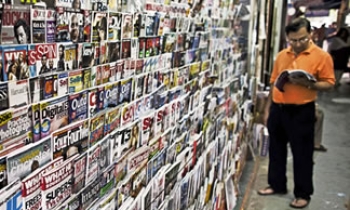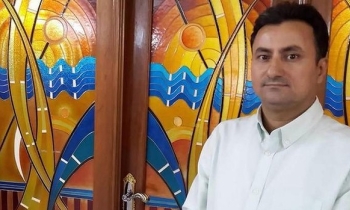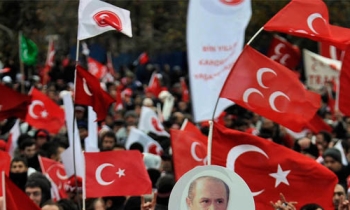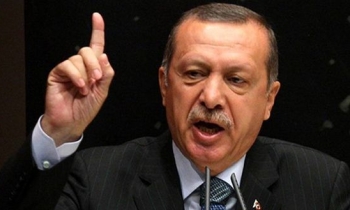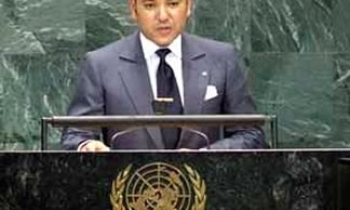COPENHAGEN: Flemming Rose, the Danish editor who published cartoons of the Prophet Muhammad that ignited what some called a war of civilizations, walked into a conference hall full of European and American Muslims here Monday, braced for more of the same.
Instead, some - Americans in particular - lined up to be photographed with him. And, though some Danish Muslims took him to task, he said, "we are still able to engage one another in conversation."
The crisis, in other words, has provoked some self-examination here and the beginnings of a more open, if sometimes rancorous, debate between the Muslim minority and the Christian majority.
"Danes have been the first to reflect on their own values and what's negotiable and what's not negotiable in our society," Rose said. "Now a lot of people in Denmark recognize that freedom comes with a price."
In many ways, Rose seems serenely unrepentant. When he appeared before the conference of scholars, intellectuals and activists, his fervor for unbridled freedom of speech seemed undiminished.
"In a democratic society, no one can have the right not to be ridiculed," he said, referring back to the 12 contentious cartoons, one of which depicted Muhammad wearing a turban fused like a bomb. "It is very important to separate the secular from the sacred. It's even more important for people who are in favor of freedom of religion."
Publication of the cartoons provoked a wave of violent protest and bloodshed in much of the Islamic world, though not in Denmark itself. Denmark's goods were boycotted in the Middle East, its flags burned and its diplomatic missions attacked.
But in Europe the crisis raised different questions, affecting not just Denmark's 200,000 Muslim minority - roughly 4 percent of the population - but millions more across the Continent: Has Europe failed to offer its Muslim immigrants a sense of belonging and acceptance? Put bluntly: On what terms will, or can, Europe embrace the immigrants it uses for its economies yet keeps remote from its societies at a time when the Continent itself is striving to define its own future?
"The two questions that Europe asks are: Is Islam compatible with democracy? Is Islam compatible with human rights?" said Ndeye Andujar, a Spanish delegate at the conference, organized by the not-for-profit American Society for Muslim Advancement.
An Iranian-born American Muslim author, Reza Aslan, said the Continent had answered those questions with "this rampant Islamophobia that has seized Europe."
The discussion in Denmark has been nuanced by divisions and upsets within Muslim society, mirrored by a creeping acceptance among some Danes that, for years, they ignored tensions just below the serene surface of their cradle-to- grave welfare state.
Just recently, for instance, nine members of the same Muslim family of Pakistani lineage were sentenced to prison terms of up to 16 years for the so-called honor killing of Ghazala Khan. Just 18 years old, she was gunned down by her brother last September because her father disapproved of her marriage to an Afghan man.
Danish Muslims in general were repelled by the killing, said Zubair Hussein, a spokesman for Muslims in Dialogue, an advocacy group. "I feel offended that we still have people who say they get some honor from killing. We cannot accept that at all." Such incidents, though, reinforce the perception of a profound divide between an inward-looking minority and an equally insular majority.
"Muslim society is living the life of the village 50 years ago," said Sara Leth, a Danish radio reporter. "Danes have to understand the language the Muslim people speak, their religion, their culture instead of assuming that they think like Danes. We don't have the same values: wake up, we are in a multicultural society."
But that recognition, she said, has come "20 years too late. Denmark is a little village, too."
Rose's appearance at the conference was, he said, the first time he had attended a public gathering of so many Muslims since the cartoon crisis erupted six months ago. At that time, his newspaper bosses sent him on leave for almost three months and his latest assignment has been to interview leading figures in the United States - not to publish cartoons.
He is still a contentious figure in Europe. At the conference here, he said, he arrived by bicycle. But, recently, traveling to speak to university students in Oxford, England, he was met by security policemen at Heathrow and escorted by them throughout his stay. The debate provoked by the cartoons also persists, pitting a European insistence on free speech against an argument that such liberties are not absolute if they offend the deepest beliefs of others.
Why, for instance, Usama Hasan, a British imam at the Copenhagen conference, asked Rose, could Europeans not learn "a sense of the sacred from Muslims."
Indeed, said Youssef Azghari, a Dutch university lecturer, "in Western culture in general they emphasize freedom rather than respect for religious figures."
Anas Osman, an American Muslim who works for a division of the investment bank Morgan Stanley, told Rose: "It's not censorship to be considerate of others."
But Rose insisted that, short of inciting murder, the freedom of speech in a secular society could not be limited by the sensitivities of anybody's faith.
"I am in favor of removing laws making Holocaust denial an offense," Rose said in an interview. "I'm against laws against blasphemy or limiting the right to ridicule religion."
During the conference, he was taken to task in particular by Danish Muslims. "The concept of free speech in Denmark was never challenged" in a manner to justify the publication of the cartoons, said Sherin Khankan, an author and head of a counseling service for Muslim women.
Fatih Alev, the Turkish-born Danish imam of a Copenhagen mosque, said Rose had not published cartoons mocking Jews and Christians, suggesting that Rose's newspaper, the right-of-center Jyllands-Posten, "has some restrictions" on freedom of expression where other faiths are concerned.
"But this is not valid when it applies to Islam," he said, echoing widespread complaints that Europeans apply different standards in dealings with Muslims.
"Many Muslims do not feel society is communicating with them. Danish society is talking about Muslims, not talking to Muslims," Alev said. Indeed, said Hussein, the spokesman for Muslims in Dialogue, "we have this debate in public that's full of monologue, not dialogue."
For all that, many people on both sides of the discussion said they felt the cartoons had tapped into and exposed what Alev in an interview called "something that was really, really wrong in this country. So what was wrong has become transparent. The cartoon crisis has been an eye-opener for Muslims, non-Muslims and people outside Denmark."

